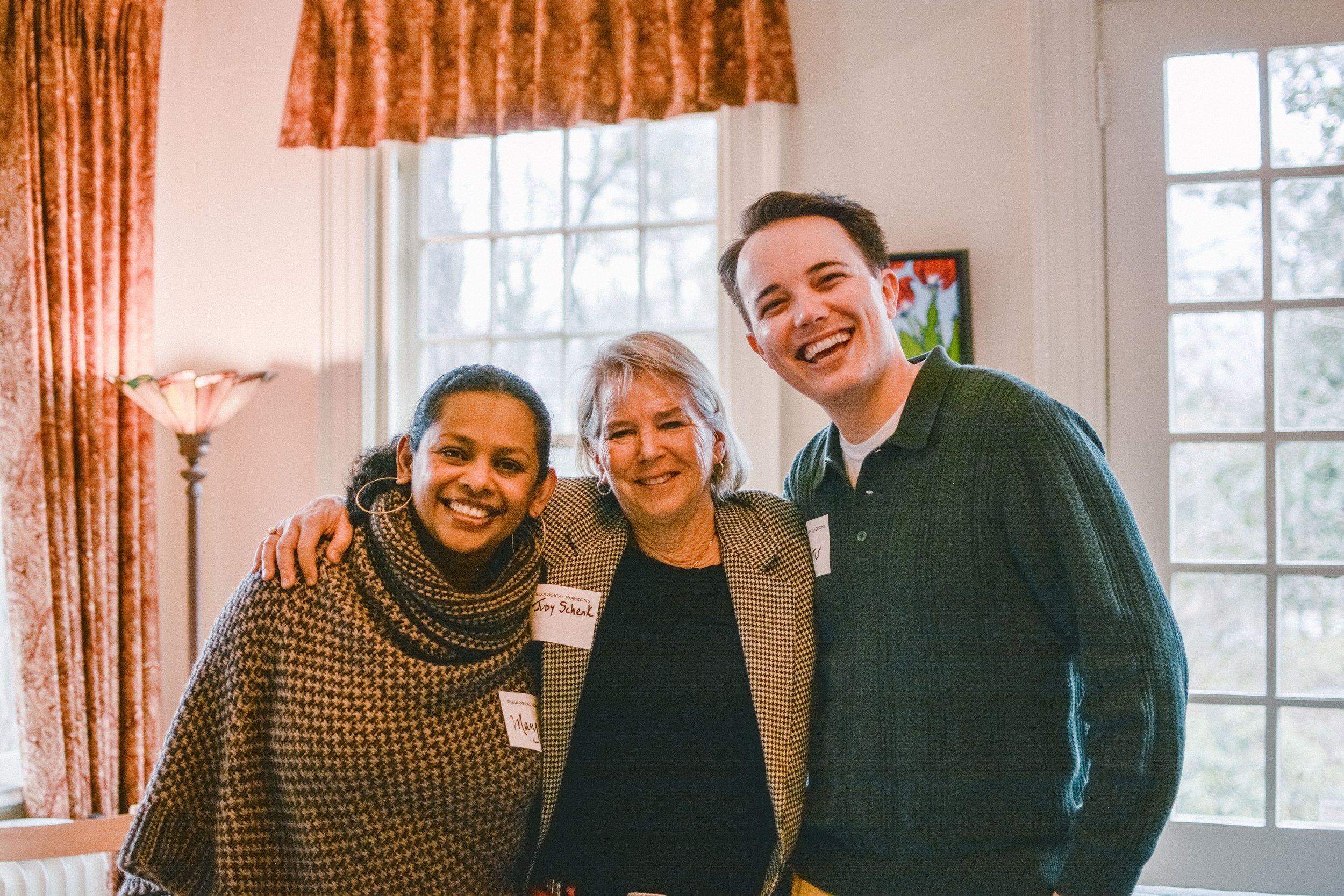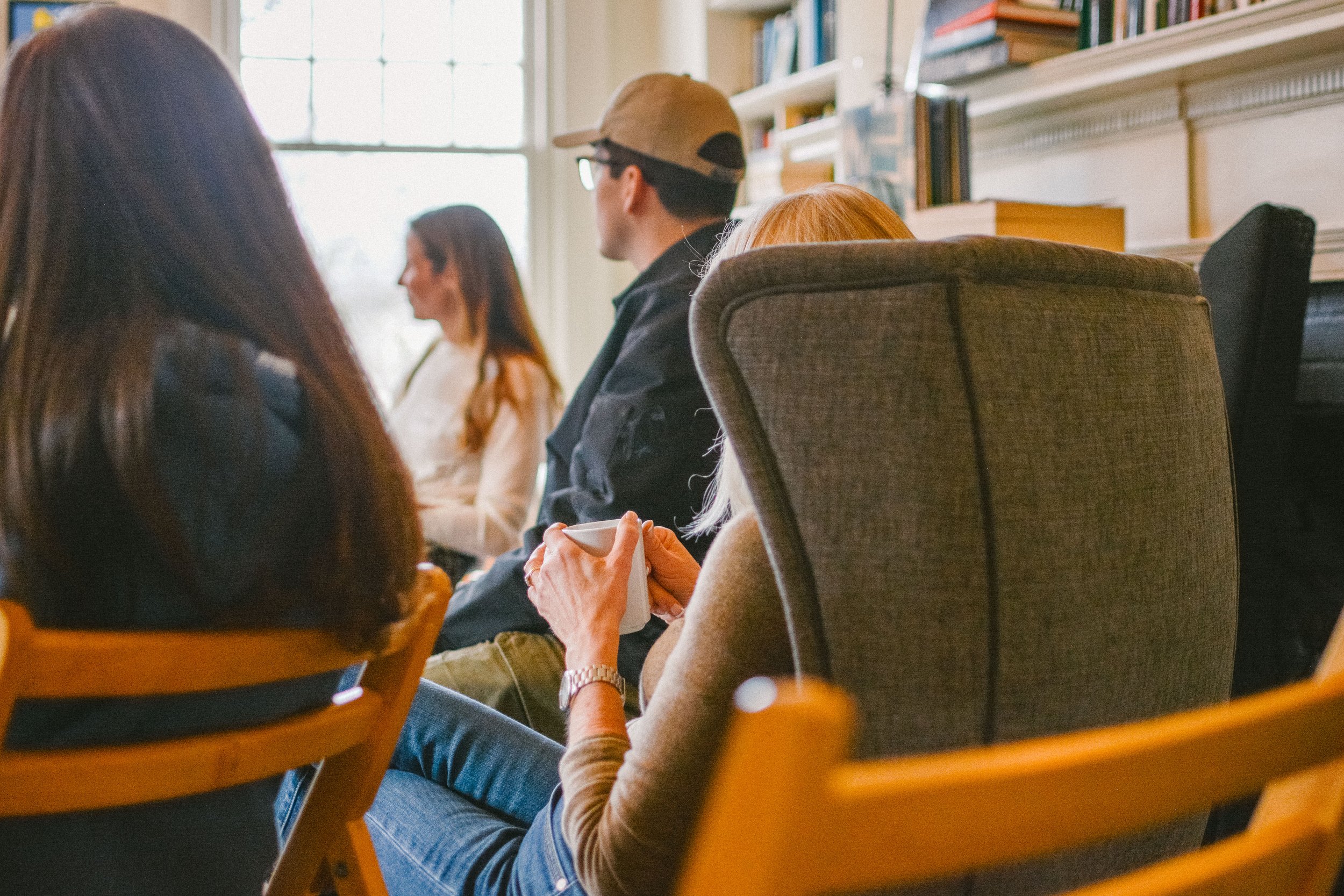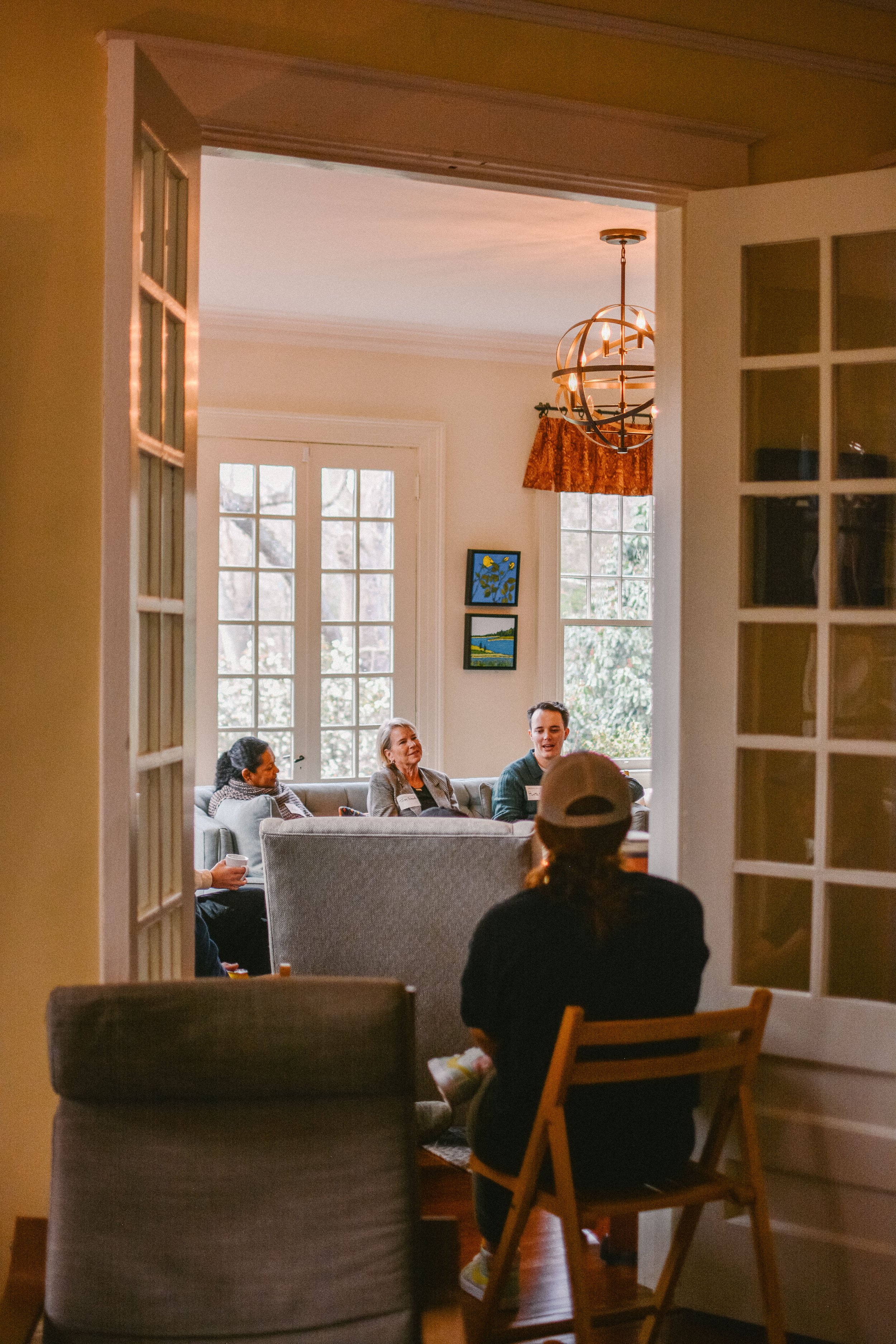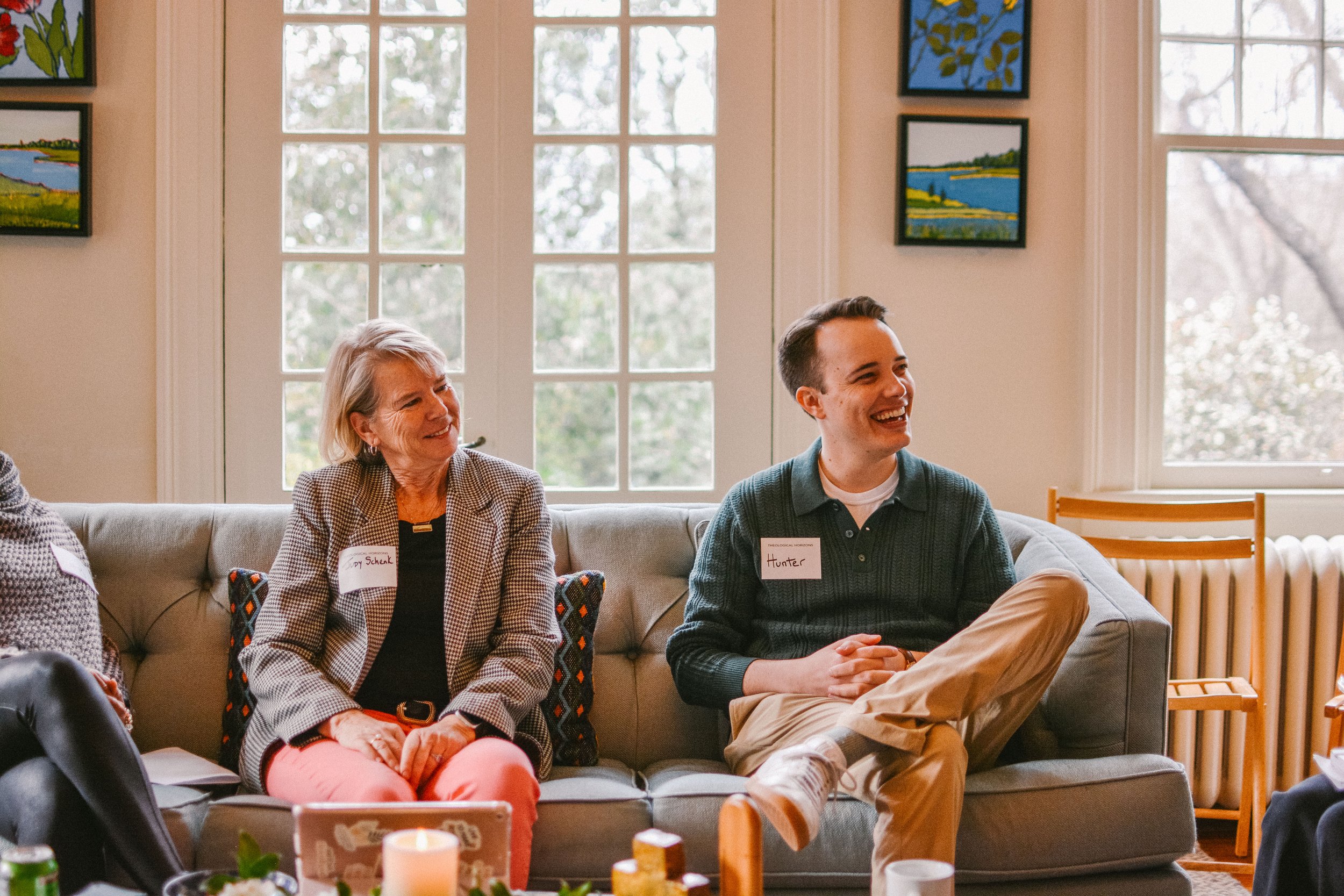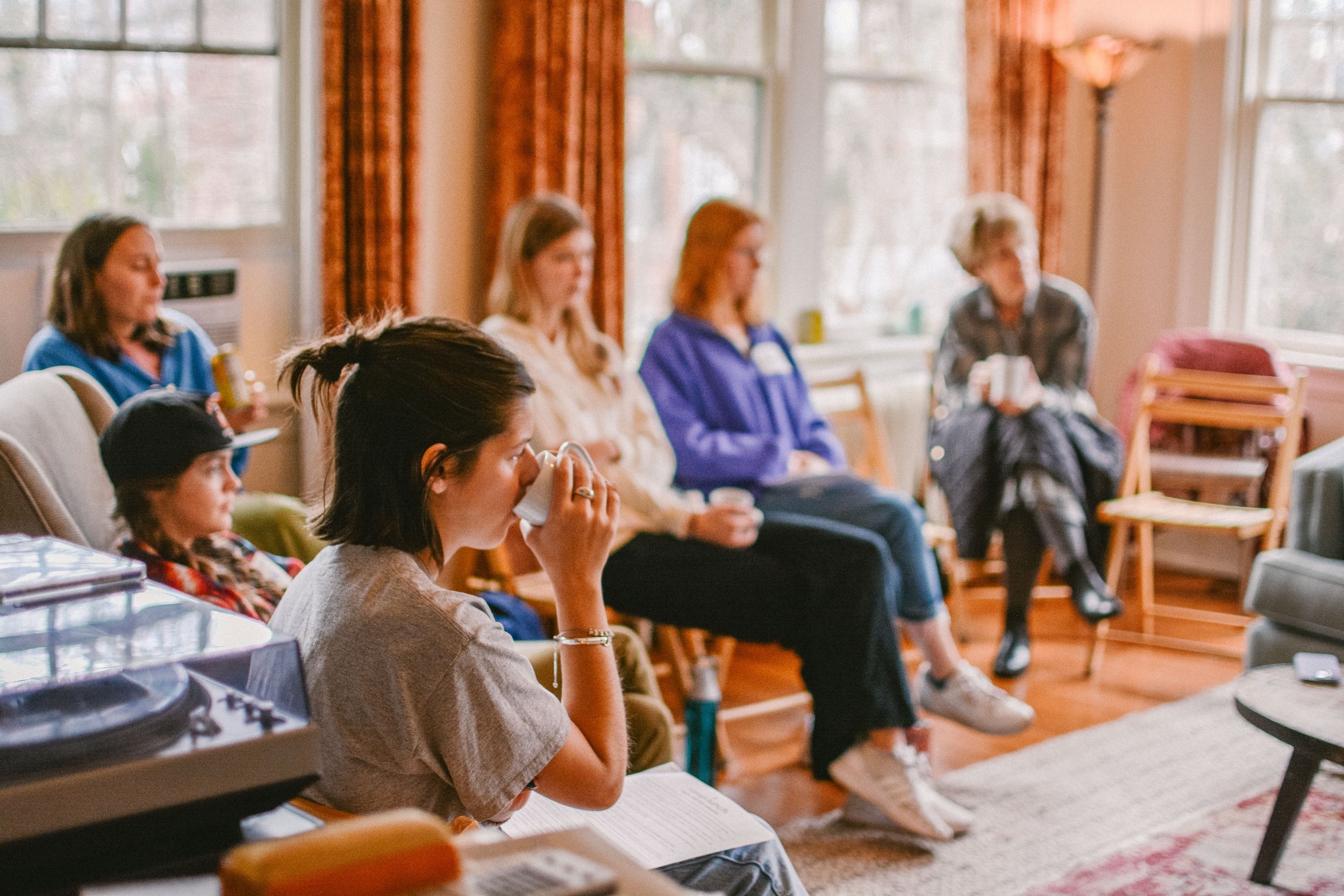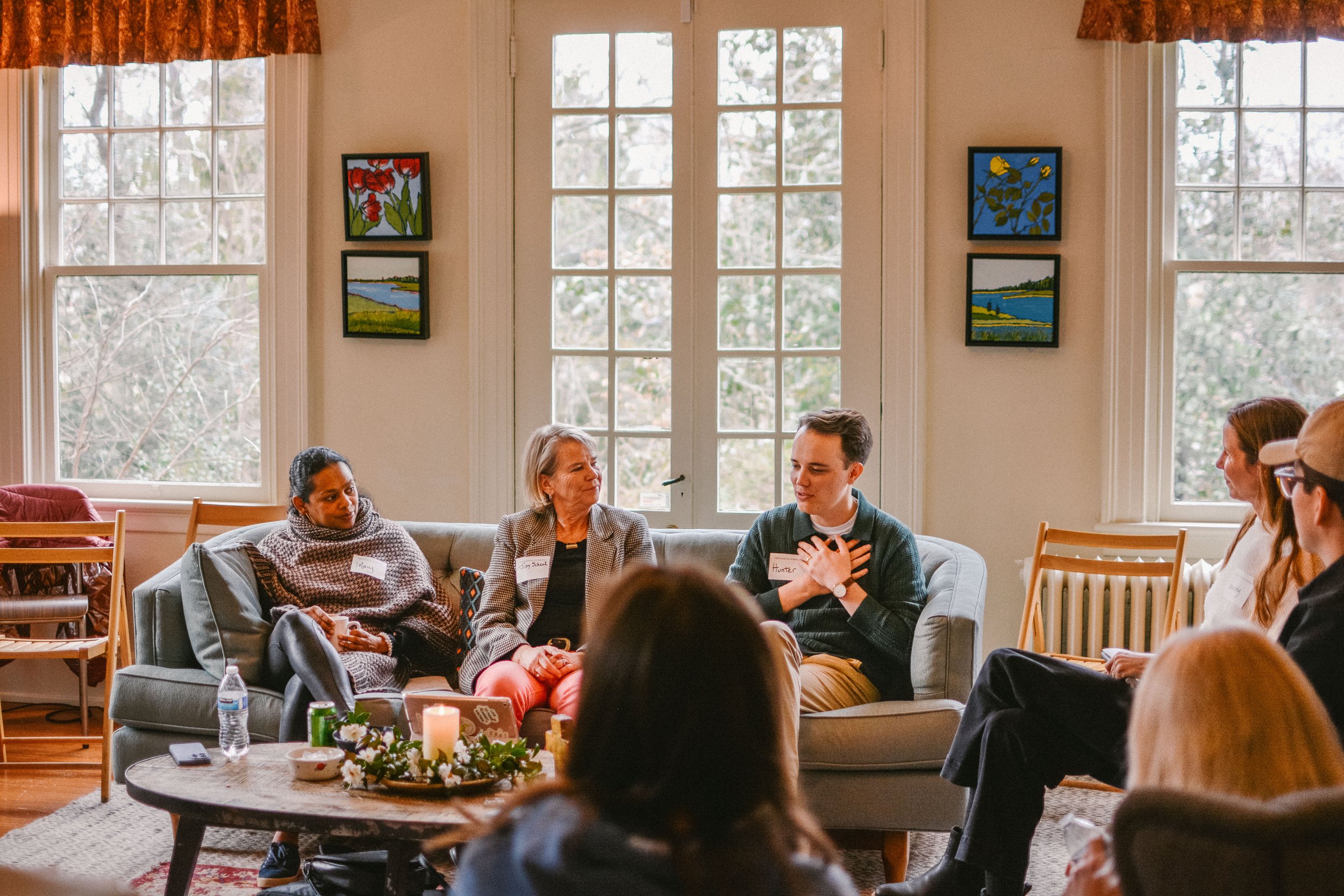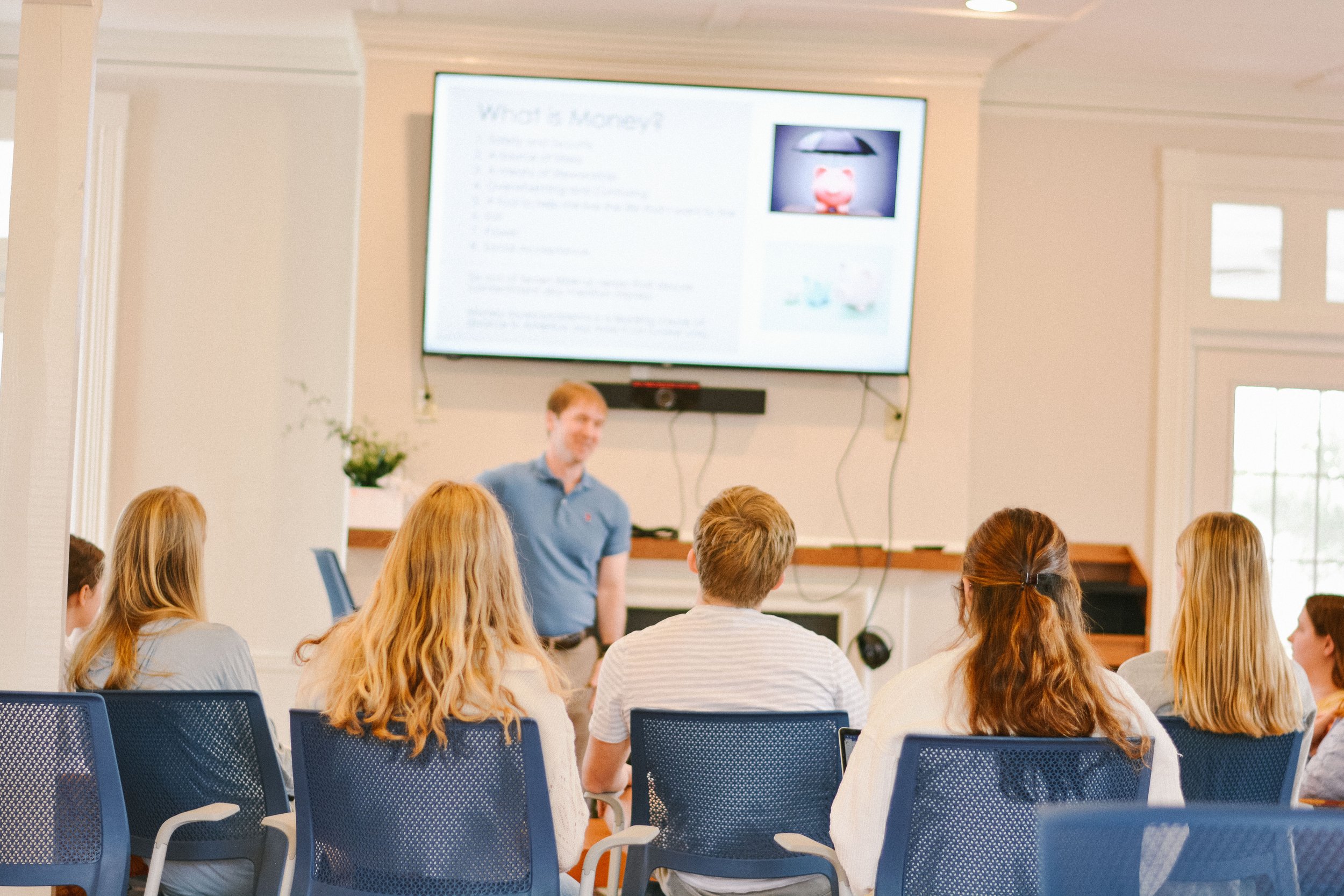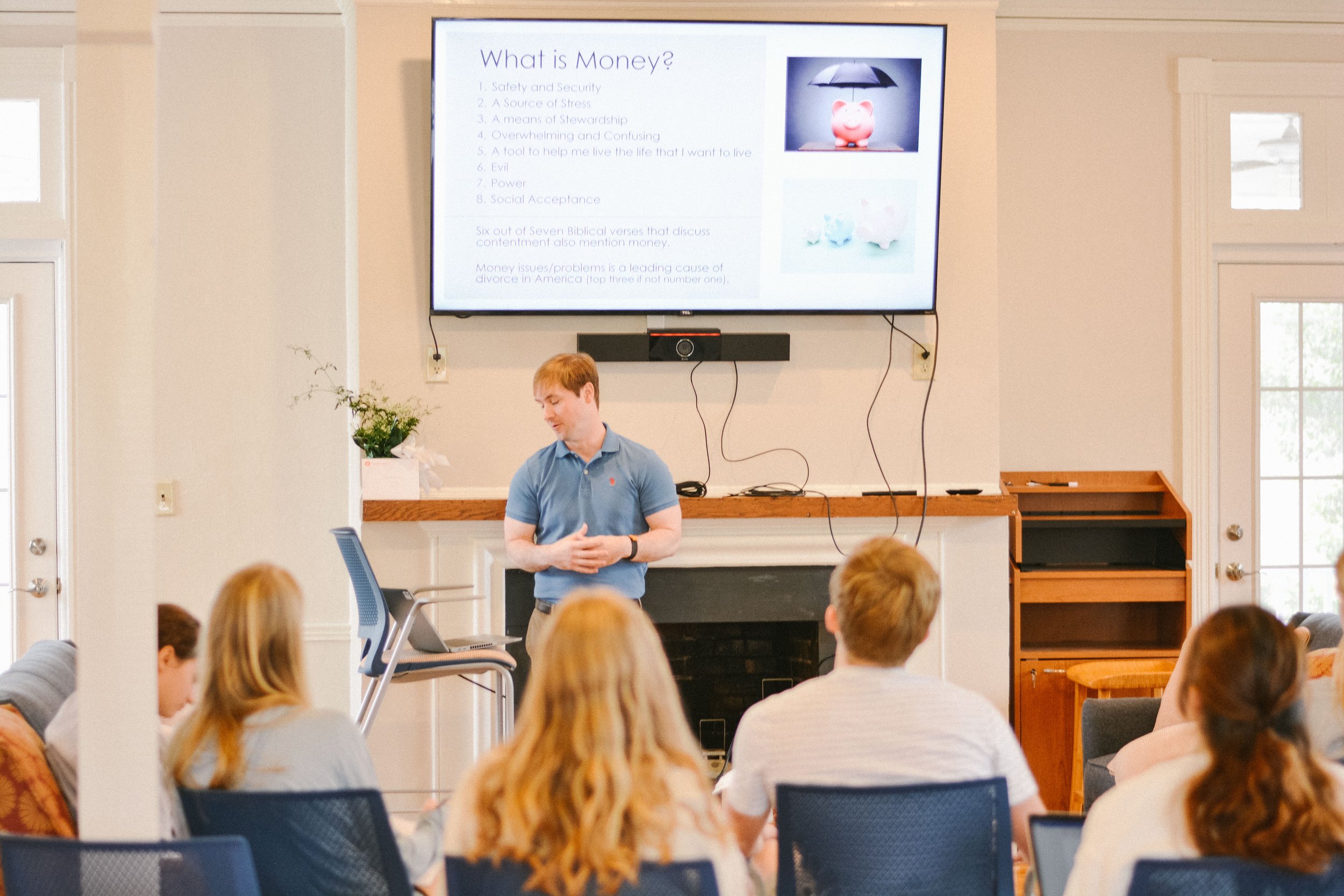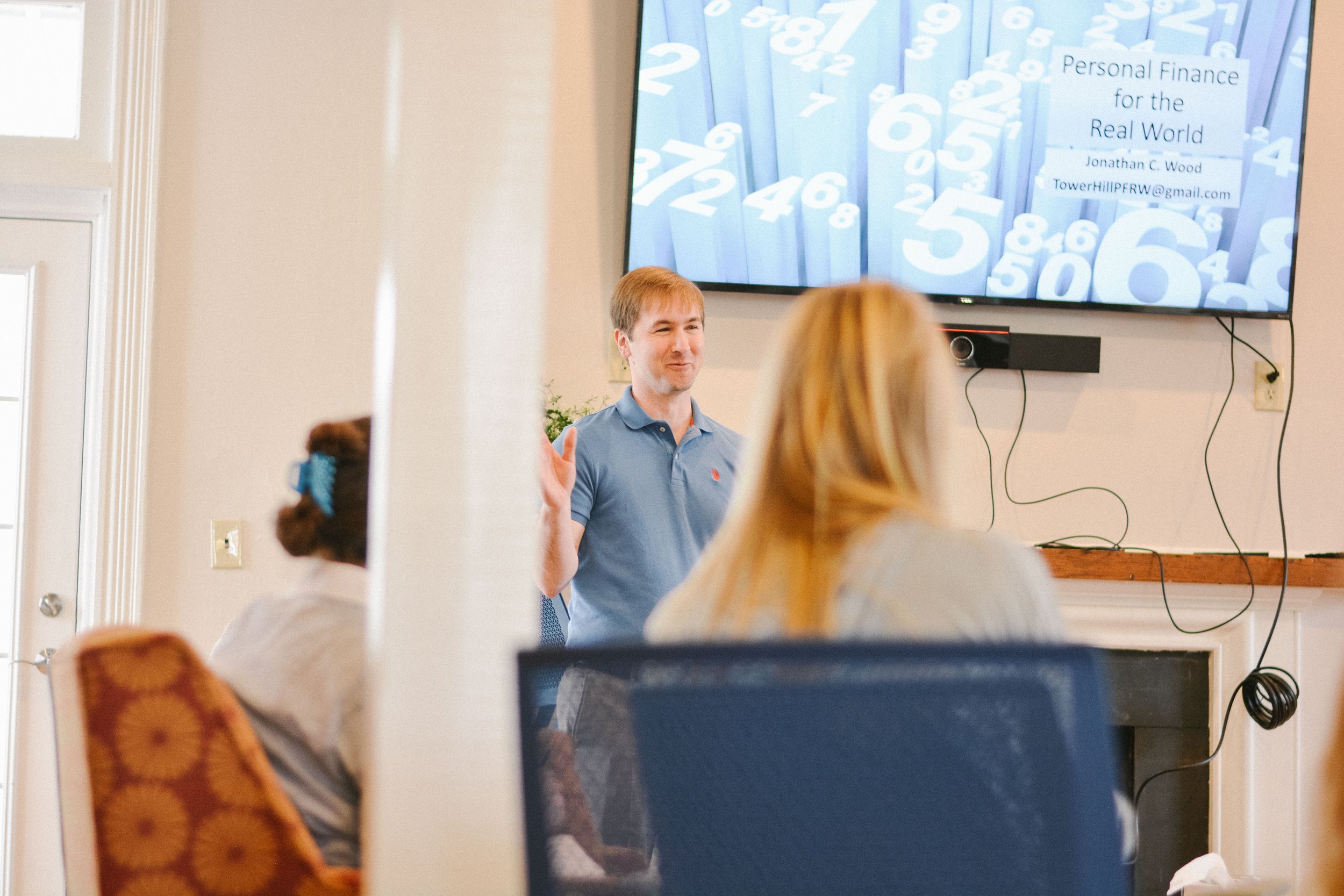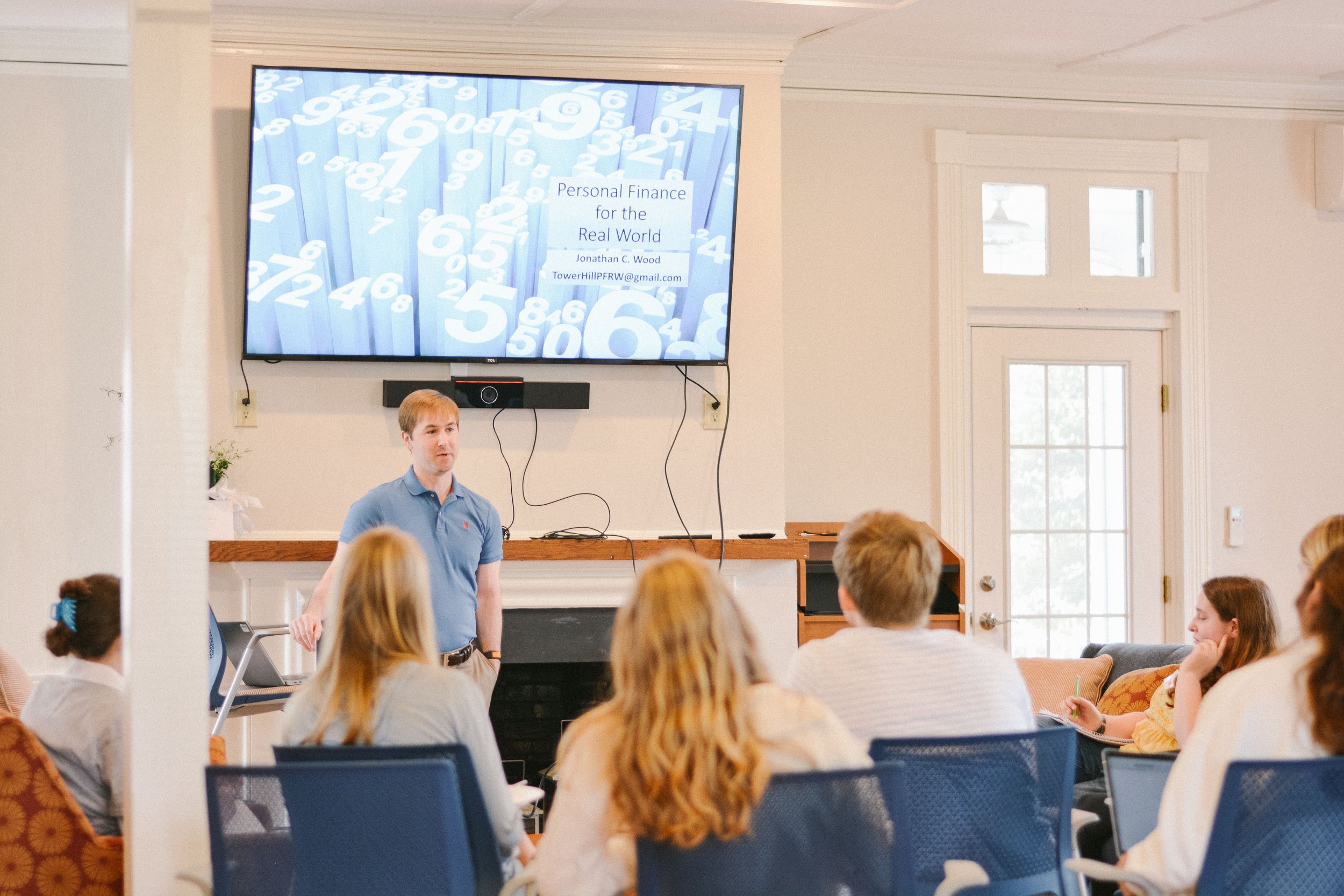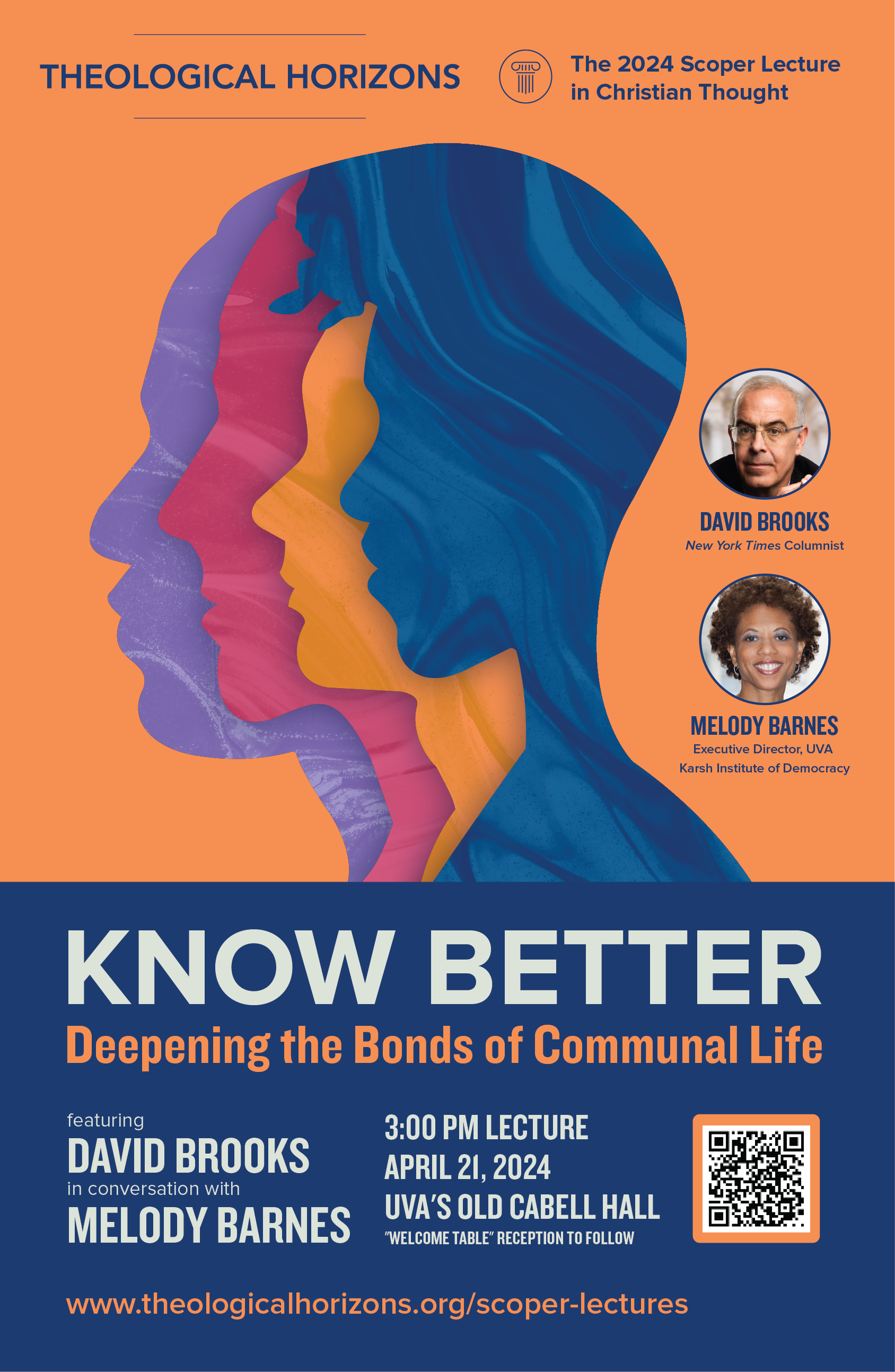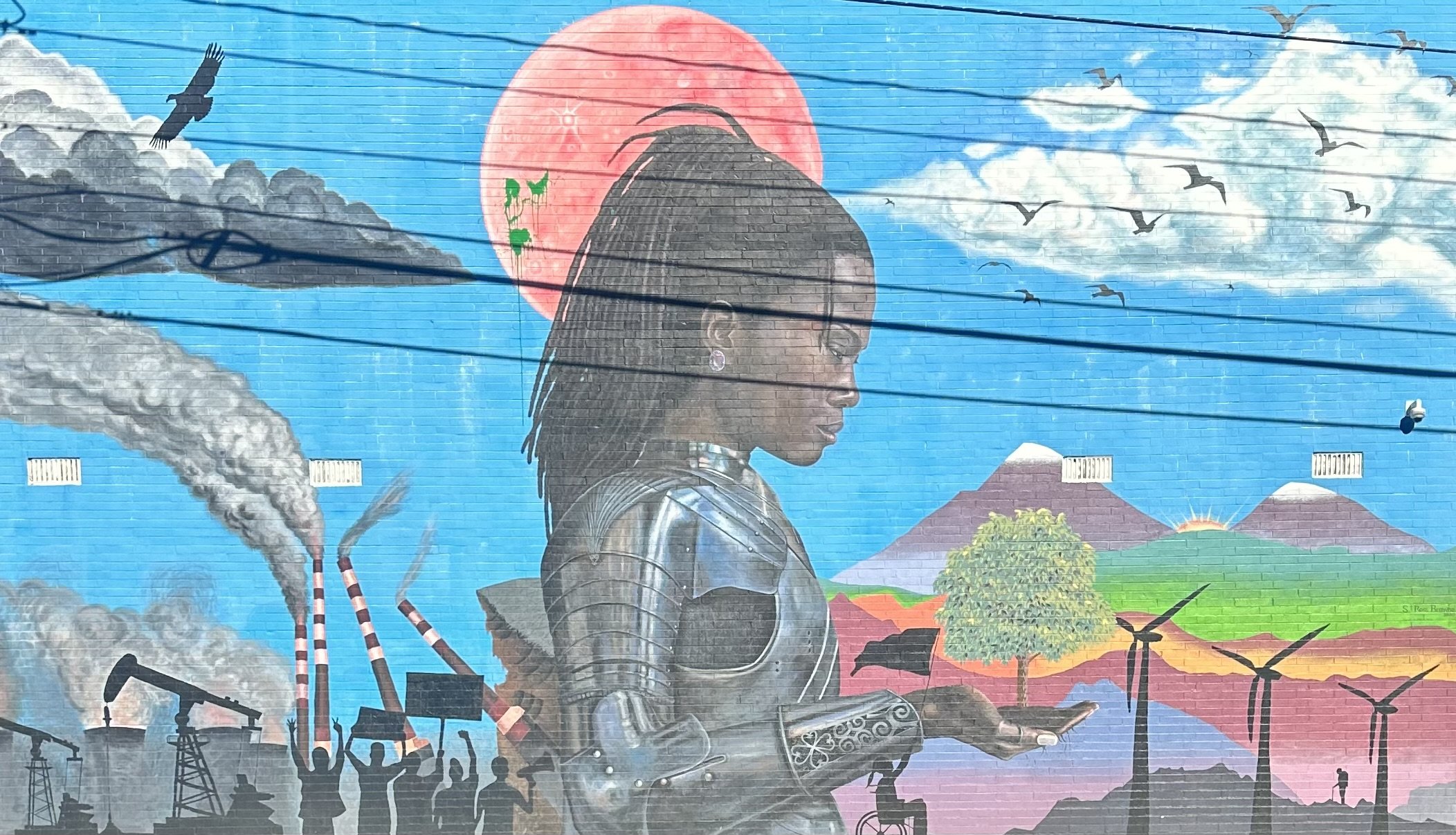Loving our Neighbors through Place | Tabi Summers '24
Editors’ note: Horizons Fellows wrestle with questions of faith & vocation within a small cohort during their 4th year. One of the questions we wrestle with is: What does it look like to love our neighbors through our particular places in which we find ourselves? Tabi reflects on that here.
What does place mean to me? How has it shaped me and how do I think of it in relation to my calling? How do my daily habits and attention towards my neighborhood and the land affect my calling?
My dad is a skilled carpenter, but he deferred the career, and the salary, that he could have had, and arguably needed, raising four children on one income. For 35 years, my dad has preferred to devote his high-quality carpentry to people who could not otherwise afford decent home improvements. He has committed himself to offering noble construction at accessible and flexible rates, consistently doing odd tasks and small projects free of charge. My father’s service through place has extended into our own home, opening our home as residence to a series of young men as they find their own footing.
My father’s craft made me aware of my interest in architecture; his honest realization of vocation has inspired my own. As a student of architecture, place means more to me than it does to most people. It can be commonly understood that architecture aims to create place, it is also deeply affected by place. The ways in which architecture responds to place is my primary preoccupation within the study. Architecture is necessarily rooted in site: this includes local and non-local ecologies, accounting for the systems surrounding the design intervention, but architecture also demands consciousness of its resource consumption, and the ecologies impacted by material sourcing. Site also must consider stakeholders, building occupants, and even more temporary observers.
Place is too often misunderstood as static. When people argue that architecture should create a sense of place, they are often asking for the architecture to conform to a historic trend, to preserve a visual sense of place. Place is rarely static, especially when considered in the context of neighborhoods and the community of a place. Relationships and individuals are constantly changing, shifting, even entering and exiting. I found a meaningful motif in John Perkins’s community development ministry. While Perkins refers to these values as the “3 Rs:” Relocation, Reconciliation, and Redistribution, I was struck instead by the repetition of “Re.” In each case, “Re” seems to imply that community development efforts should be cyclical. We should continually return to the efforts that enrich our places. We should maintain a pulse on our community, our place, and its needs.
For example, Jesus relocated among us; Perkins implies that relocation calls us to move outside of our comfort zone to be in proximity, immersed, in communities we aim to serve. My father’s invitation of young men into our home reminds me of this “R.” My father’s continual practice of opening our house to a series of young men, even after difficult experiences with each, reminds me of the “Re” component of this “R.”
Altogether, my attention to place, neighbors, and land, must not be an effort of creating or preservation, but of continual recommitment to vocation, and a cyclical understanding of my aspirations and actions.
Lent VI | To Fast from Certainty
“Why spend money for what isn’t food, and your earnings for what doesn’t satisfy.
Listen carefully to me and eat what is good; enjoy the richest of feasts.
Listen and come to me; listen, and you will live.
”
AN INVITATION TO FAST FROM CERTAINTY…
“When my mother suddenly died, I was thrust into the desert,” spiritual author Christine Valters Paintner recalls. “All of my certainties about God and life were stripped away and I was left raw and frightened. Many people offered trite words and shallow comfort in my grief. They were not willing to sit with my in the darkness, but only hoped to rush me through a place of light.” Have you ever been in such a place?
By journeying into the desert, Jesus showed us how to dwell in life’s border spaces where questions overwhelm answers, where Jesus depended solely “upon every Word that comes from the mouth of God.” (Matthew 4:4)
Patience abides in the wisdom of those ancient Christians who lived in the wilderness --- who tell us to let go, let go, let go, and let go some more, on every level of our lives, to everything we cling to, including, or especially, our ideas about God.
In the book of Job, God challenges Job’s desire for surety and asks, “Where were you when I laid the foundation of the earth?” (Job 38:4) For God is never a set of concepts to be grasped, even tamed, but a relationship to encounter.
… AND EMBRACE MYSTERY AND WAITING
Traveling through the unknown requires humility. It requires loosening our attachment to images of who God is and how God works in the world. Ultimately, the Lenten desert sojourn demands that we open ourselves to the God who is far more expansive than we can behold or imagine.
This sixth week of Lent, you are invited to fast from the places in your life where you crave certainty and sure outcomes and release them to the great Mystery: Father, Son and Holy Spirit. Celebrate a God who is infinitely larger than your imagination and rest in the company of Jesus, who himself once inhabited the wilderness.
This reflection is adapted from A Different Kind of Fast: Feeding our True Hungers in Lent, Christine Valters Paintner.
The Scoper Lecture with David Brooks | Overview
Renowned author and New York Times commentator David Brooks will deliver the 2024 Scoper Lecture in Christian Thought at UVA: the anchor event of an in person and livestreamed community-wide, intergenerational experience.
On Sunday, April 21, David Brooks will speak on the topic “Know Better: Deepening the Bonds of Communal Life” drawing on his book, How to Know a Person: The Art of Seeing Others Deeply and Being Deeply Seen and exploring his sources in Christian thought. The academic lecture will illuminate Brooks’s foundational work on the complexities and urgencies of living well in a democratic society.
Melody Barnes, Executive Director of UVA’s Karsh Institute of Democracy, will then join Brooks onstage to investigate the implications of Brooks’s premise that “there is one skill that lies at the heart of any healthy person...or society: the ability to see someone else deeply and make them feel seen—to accurately know another person, to let them feel valued, heard, and understood.”
The onstage lecture and conversation will be framed by music from The Porter’s Gate, a sacred ecumenical arts collective whose projects include “Neighbor Songs” and “Table Songs.”
The Charlottesville Welcome Table
Sunday, April 21, 4:45pm-5:45pm | Amphitheater | free
Calling all Scoper Lecture guests to enjoy the Charlottesville Welcome Table reception: a special event in the UVA Amphitheater. Gather with us for warm conversations and delicious homemade pie. Let’s reflect on the keynote, practice the art of listening, and turn strangers into friends to deepen the bonds of community.
“Leap of Faith” Filmmaker Conversation
Monday, April 22, 10am-11am | Dome Room | free
Award-winning director Nicholas Ma will speak with UVA’s Chief Creative O cer Matt Weber as he presents exclusive glimpses of his forthcoming film, “Leap of Faith,” a documentary following pastors who test the power of Christ’s call to love God and neighbor — even across deep di erences. Ma’s earlier film “Won’t You Be My Neighbor?” explored the life of Mr. Rogers.
“The Stories That Shape Us: How Sharing Experience Fosters Connection” Monday, April 22, 11am-12pm | Dome Room | free
A panel featuring
Jocelyn Diaz, career film and television executive at Disney, HBO and ABC TV, and executive producer of House of the Dragon
Greg Khalil, co-founder of peacemaking nonprofit Telos and founding member of Narrative 4, a story-centered educational initiative
Ian Solomon, dean of UVA’s Frank Batten School of Leadership and Public Policy, committed to negotiation and conflict resolution
Gayle Jessup White, Monticello’s public relations and community engagement o cer and author of Reclamation: Sally Hemings, Thomas Je erson, and a Descendant's Search for Her Family's Lasting Legacy
moderated by Anne Snyder, editor-in-chief of Comment magazine hosted by Sheri Winston, associate director for the UVA Rotunda and Major Events with a “flash” story by Abdallah Aljerjawi, UVA nursing student
Book Discussion Guide
Get the conversation started with our free discussion guide to How To Know A Person: The Art of Seeing Others Deeply and Being Deeply Seen, created by the team at Theological Horizons. Find it on our website.
At Theological Horizons, we create communal and individual experiences that bring together rich intellectual ideas with an immediate practice of attention and compassion, drawing on the riches of Christian thought – that we trust will yield a measure of personal and spiritual knowing, even as we stand, quite literally, amidst the complex legacy of one of America’s greatest Universities.
The Scoper Lecture in Christian Thought is an annual series that brings eminent speakers to the university to deliver public lectures exploring the breadth of Christian expression in the arenas of scholarship, science and medicine, the arts, and culture. The series is an initiative of Theological Horizons, a community-campus not-for-pro t, in partnership with The Project on Lived Theology at UVA.
Lent V | To fast from Planning & Deadlines
“Why spend money for what isn’t food, and your earnings for what doesn’t satisfy.
Listen carefully to me and eat what is good; enjoy the richest of feasts.
Listen and come to me; listen, and you will live.
”
AN INVITATION TO FAST FROM DEADLINES AND PLANNING…
I love a to-do list, a plan. But when my noisy mind is chattering with details, deadlines, and agendas, I easily miss the voice of God actually speaking into my life – calling me into things better than those my planning mind intends.
We who are always moving into our imagined futures lose the opportunity to notice new visions from Jesus; we fail to receive guidance toward new directions we haven’t expected. Looking ahead, we don’t look down to see the fresh, green life unfurling at our feet – quite literally, on this early spring days.
… AND EMBRACE UNFOLDING AND RIPENING
“I am the true vine,” Jesus says. “Abide in me as I abide in you. Just as the branch cannot bear fruit by itself unless it abides in the vine, neither can you unless you abide in me. I am the vine; you are the branches.” Jesus reminds us of our organic nature. Branches don’t design their own futures; they grow, unfold and bear fruit by abiding. We too are rooted in the One greater than ourselves --- and in this rooting we receive nourishment to ripen in the world. For Jesus reminds us, “Those who abide in me and in them bear much fruit, because apart from me you can do nothing.” (John 15:1-5)
This fifth week of Lent, you are invited to fast from your desire to control the direction of your life. Open yourself to the grace of silence, in which beauty comes alive and you see, with open eyes, things already emerging.
You might respond to this invitation by stepping outside. Take time for a slow, contemplative walk –without any destination or time constraint. As you walk, stay alert for the shimmering moments around you; allow yourself to pause. Pay special attention to how the world is budding, unfurling, emerging around you. In silence, listen for God’s voice speaking love and blessing over you. Abide in Him.
This reflection is adapted from A Different Kind of Fast: Feeding our True Hungers in Lent, Christine Valters Paintner.
Lent IV | To fast from Holding it all Together
“Why spend money for what isn’t food, and your earnings for what doesn’t satisfy.
Listen carefully to me and eat what is good; enjoy the richest of feasts.
Listen and come to me; listen, and you will live.
”
AN INVITATION TO FAST FROM HOLDING IT ALL TOGETHER…
In the face of grievous loss, do you bravely pull yourself together, carry on with life? In our armored efforts to keep sorrow from spilling into our days, you and I carry the burdens of blocked emotions: tightness, tension, pretense. Could there be another way to live with grief – sadness for ourselves, our loved ones, our world? Might we follow in the way of Jesus, who, upon the death of Lazarus was “greatly disturbed in spirit and deeply moved,” and wept along with his friends? (John 11:32-35)
… AND EMBRACE TENDERNESS AND VULNERABILITY
“Tears and weeping…bespeak a promise. In fact, they are the only way into the heart.” (John Chryssavgis) Ancient Christians spoke of the “gift of tears:” tears that express grief and tears that soften the defended places in our lives, places where we have turned from God. Through the gift of tears, our hardened shells are punctured, and we know more of who we are in Christ, free from false courage whenever we feel anxious or sad.
This fourth week of Lent, may we give way to vulnerability, to tenderness. If tears come, may they bathe us in God’s grace, recalling the promise: “You have collected all my tears in a bottle.” (Psalm 56:8)
God of our weeping,
Hold us in our times of loss, be with us as we give expression to our love.
Bathe us in the brine of healing, gather our tears in your vial, wash us clean.
When we reach for strength and resist our sorrow, be a sanctuary for us.
Show us the river of our sobs and the great sea of collective grief it meets.
Let wave upon wave carry us to the shores of your Love.
Remind us we are not alone in our sense of loss,
Sanctify our tender places, make holy our humanity.
Help us to know grief and joy as sisters,
How loss carves us out, making room one day for a newfound delight.(Christine Valters Paintner)
This reflection is adapted from A Different Kind of Fast: Feeding our True Hungers in Lent, Christine Valters Paintner.
Lent III | To fast from Speed & Rushing
“Why spend money for what isn’t food, and your earnings for what doesn’t satisfy.
Listen carefully to me and eat what is good; enjoy the richest of feasts.
Listen and come to me; listen, and you will live.
”
AN INVITATION To fast from speed and rushing
Do you feel stretched thin by commitments, needs and demands? Depleted by rushing --- yet at a loss to make a change? In our culture, being busy is a mark of a full, desirable life, a measure of our value as productive people. As we speed from one thing to another, we skim over the surface of life, losing that sacred attentiveness that brings forth revelations in the most ordinary of moments.
From the first verses of Genesis, God calls us to another way. Having made all of creation over six “good” days, the Author of Time took a break. God didn’t apologize for it, wasn’t dramatic about it. God rested because God wanted to rest, plain and simple. And this Sabbath day of rest was even better than “good” – God called it “holy.”
… AND EMBRACE SLOWNESS AND PAUSING
Instead of centering work and productivity, we are invited to shift our priorities, to center God as the primary focus of our lives, the source of our value.
The monastic tradition lifts up the simplest of practices: to stop one thing before beginning another. What might it be like to allow just a five minute window to sit in silence between appointments? Or to take five long, slow deep breaths before pushing on to the next thing? Could we plan for holy pauses in which to savor God’s good presence?
We think of our in-between times as wasted moments and inconveniences, yet these thresholds are opportunities to awaken the gifts that are right here with us. (How often do we miss these, waiting on the relief we imagine is out there, beyond our never ending labors?)
Theologian Howard Thurman writes: “One could not begin the cultivation of the prayer life at a more practical point than deliberately to seek each day, and several times a day, a lull in the rhythm ofdaily doing, a period where nothing happens that demands active participation.” This lull of being rather than doing is a holy pause. “The moment of pause, the point of rest, has its own magic,” Thurman assures us.
This third week of Lent, may you offer yourself the gift of small thresholds, those moments when you let go of what came before and prepare yourself to enter fully into what comes next. May you sink into the sheer grace of the moment. Let us all listen to our true hunger for holy pauses: spaces where God can work.
This reflection is adapted from A Different Kind of Fast: Feeding our True Hungers in Lent, Christine Valters Paintner.
** Image of Tricia Hersey, founder of the Nap Ministry and author of Rest is Resistance.
Lent II | To fast from Worry
“Why spend money for what isn’t food, and your earnings for what doesn’t satisfy.
Listen carefully to me and eat what is good; enjoy the richest of feasts.
Listen and come to me; listen, and you will live.
”
AN INVITATION TO FAST FROM WORRY…
“How can I rest if I have to pay the bills?” Tricia Hersey poses this “desperate and valid” question in her book, Rest is Resistance. For those of us plagued by a sense of scarcity, perpetual anxiety for the future keeps us exhausted. We feel a lack of funds, of time, of love, of control, of hope. The torrent of fearful thoughts rise up in our minds and fire our efforts to secure our own wellbeing and the security of the ones we love, our neighbors, our world.
Walter Bruegemann reminds us that the practice of Sabbath emerged from the Exodus story, where the Israelites were freed from the relentless labor and productivity of the pharaoh system. God acted to liberate his people from enslavement, yes, but also from the anxiety that deprivation brings. God called for the discipline of rest.
… AND EMBRACE TRUST IN GOD’S ABUNDANCE
“What if what is central to God’s reality is not the mechanistic, utilitarian survival of the species, but the exuberant abundance of Creation and New Creation?” asks artist-theologican Makoto Fujimura.
In the face our culture’s demand for accomplishing and achieving and possessing, the God who celebrates abundance has already granted us the good gift of simply being. The practice of sabbath freedom must come now, even in the midst of the world’s anxious messages of scarcity. For as Thomas Merton writes, “Here is the unspeakable secret: paradise is all around us and we do not understand.”
Rest and restoration may come in small ways: closing one’s eyes to daydream for ten minutes or catnapping in the middle of the day. To love freely, to give of one’s time generously, to practice compassion without bounds. We are called to do this for ourselves and for others – out of God’s unlimited surplus.
This second week of Lent, might we fast from worry over scarcity and fear for the future – in order to trust in God’s abundance lavished upon us? Let us listen to our true hunger for contentment in this present moment and cultivate hope in the fullness of life in Christ.
Carry this blessing into the coming week:
Holy Spirit of generous abundance, remind us that there is always more than enough:
enough food, enough love, enough time, enough resources.
Help us to see how our patterns of living in separation and disconnection amplify our scarcity.
Bring us into the joy and challenge of community where bread divided multiplies,
where laughter shared overflows.
Empower us to share freely from our own abundance with others in need.
Slow us down to see how time expands when we breathe and pay attention.
Bless us in our efforts to trust in God’s goodness:
the Love that pulses through the world, sustaining it moment by moment.
Give us the courage to speak out when resources are distributed unfairly,
so we may remind others that there is more to share.
Encourage us to release that which we no longer need to hold onto so tightly.
Inspire us to live in a way that witnesses to our trust in the lavish fullness of life in Christ.
This reflection is adapted from A Different Kind of Fast: Feeding our True Hungers in Lent, Christine Valters Paintner.
Lent I | A Different Kind of Fast
“Why spend money for what isn’t food, and your earnings for what doesn’t satisfy.
Listen carefully to me and eat what is good; enjoy the richest of feasts. Listen and come to me; listen, and you will live.
”
AN INVITATION TO FAST FROM MULITASKING AND INATTENTION…
We are tempted to think that in our busy lives multitasking will somehow make us more efficient, productive and happy. We scatter our gaze between so many things, but don’t we discover that inattention leaves us dissatisfied and undernourished? Writer Cole Arthur Riley puts it this way: “We have found ourselves too busy for beauty. We spin our bodies into chaos with the the habits and expectations of the dominating culture, giving and doing and working.” Distraction is seductive because it makes no demands on us, but ultimately our deep hunger for what is true, beautiful and holy calls us through the veil of our diversions – if only we will listen.
… AND EMBRACE FULL PRESENCE TO THE MOMENT
God invites us to fully experience our inner and outer lives, so filled with grace and beauty, pain and forgiveness. God calls us to behold --- not to stare or to glance, not take a quick scan or a presuming look, but to see with the reflective and reverential quality that is beholding. When we behold, we release our expectations of what we think we will see and receive what is actually there; in the process, everything can shift. We simply cannot multitask and behold at the same time. Seeing this way takes time and patience.
Riley describes the loving looking that God desires for us: “a fidelity to beholding the divine in all things. In the field, on the walk home, sitting under an oak tree that hugs my house. A sacred attention.” (from This Here Flesh)
This week of Lent, might we fast from multitasking and inattention – in order to behold? Let us listen to our true hunger for a slow and spacious way of seeing God and the world.
You can begin right now by taking 8 minutes and 37 seconds to listen to The Jesus Collective sing, “Behold the Beauty.”
This reflection is adapted from A Different Kind of Fast: Feeding our True Hungers in Lent, Christine Valters Paintner.
*Image by Kreg Yingst. Slowness & Pausing, original block print.
Life and How to Live it Panel Discussion
We know navigating the college years and next steps is hard! SO, we hosted a panel discussion featuring three wise friends: a life coach, a career counselor and a therapist. Learn more about what they do, why they do it and how they got there during this candid conversation.
Jonathan Wood Flash Finance Workshop
Back by popular demand! We’re offering another flash personal finance workshop with Jonathan Wood. In this 3 hour block, students learned about the basics of handling money, including:
the basics of assets vs. liabilities
how to determine your true hourly wage
the difficulties of purchasing a home and common mortgage mistakes
the pervasive and destructive mechanics of credit card debt
different types of investments
retirement plans
marriage and finances
the importance of starting to save monthly as early as possible
“Money is Time. How many hours of your life are you willing to trade for your next purchase?”
The secret to mastering our current financial landscape and getting out of the “rat race”? Wood says that instead of using your monthly income for only liabilities, invest in different assets that will make and generate income for you in the future. Eventually, your assets are able to generate income to pay for your monthly expenses without using your "paycheck" or hours of your life. When your investments and passive income streams are able to pay all of your monthly expenses then you have reached financial independence. Now, you are able to work because you want to, not because you have to.
“My most successful clients are those with multiple streams of income from various assets.”
The key to budgeting? Create an Anti-Budget: determine the amount of money you need to save to reach the goal of financial independence at your target age and consider everything else spendable. This eases the shame and guilt of spending while also ensuring financial stability since you have already "paid yourself first".
New to investing? Jonathan advises you to be honest with yourself about whether you can handle the ups and downs of a market as a long-term investor, or whether you’re looking for a short-term payoff. Research a few companies that you know well and evaluate whether the dividends will help you pay your bills.
Thinking about getting a credit card? DON’T BOTHER, says Jonathan. Credit card companies want you to max out your card or only pay the minimum mandatory payment every month and incur credit card debt, which Jonathan calls financial cancer, as you can spend decades paying astronomically more than what your original loan was in interest payments alone. If you have to use a credit card to boost your credit score, spend it only on gas once a month, or another regular payment that you pay off in full. The alternative? Always use cash. It has been scientifically proven that people spend 36-47% less when they use cash consistently instead of a credit or debit card.
Worried about student loans? While this is a very personal and often emotional topic, it may be better, says Jonathan, to save monthly for your future instead of rushing to pay off your student loans as fast as possible, as student loan interest rates are typically competitive (although some private lenders have higher rates then government loans) and you do not want to lose the time value of money by delaying your long-term investment plan to pay off a loan that has (typically) a ten year pay-off schedule.
Jonathan also stressed that everyone's situation is different and that while these ideas and strategies have worked well and led to positive results for many people over the years, they are not specific recommendations for any one individual.
Scoper Resources & Companion Events 2024
THE 2024 SCOPER LECTURE IN CHRISTIAN THOUGHT
Old Cabell Hall at the University of Virginia
April 21, 2024 at 3:00pm
“KNOW BETTER: DEEPENING THE BONDS OF COMMUNAL LIFE”
with David Brooks
in conversation with Melody Barnes
Renowned author and New York Times commentator David Brooks will deliver the April 21, 2024, Scoper Lecture in Christian Thought in Old Cabell Hall at the University of Virginia: the anchor event of an in person and livestreamed community-wide, intergenerational experience.
David Brooks will speak on the topic “Know Better: Deepening the Bonds of Communal Life” drawing on the themes of his new book, How to Know a Person: The Art of Seeing Others Deeply and Being Deeply Seen and exploring his sources in Christian thought. The academic lecture will illuminate Brooks’s foundational work on the complexities and urgencies of living well in a democratic society.
Melody Barnes, Executive Director at UVA’s Karsh Institute of Democracy, will then join Brooks onstage to investigate the implications of Brooks’s premise that “there is one skill that lies at the heart of any healthy person, family, school, community organization, or society: the ability to see someone else deeply and make them feel seen—to accurately know another person, to let them feel valued, heard, and understood.”
The onstage lecture and conversation will be framed by music from The Porter’s Gate, a sacred ecumenical arts collective whose projects include “Neighbor Songs” and “Table Songs.”
The Charlottesville Welcome Table reception will follow the lecture
Sunday, April 21, 4:45pm-5:45pm | Amphitheater | free
Calling all Scoper Lecture guests to enjoy the Charlottesville Welcome Table reception: a special event in the UVA Amphitheater. Gather with us for warm conversations and delicious homemade pie. Let's reflect on the keynote, practice the art of listening, and turn strangers into friends to deepen the bonds of community.
Join us the following day for
“Leap of Faith” Filmmaker Conversation
Monday, April 22, 10am-11am | Dome Room | free
Award-winning director Nicholas Ma will speak with UVA’s Chief Creative Officer Matt Weber as he presents exclusive glimpses of his forthcoming film, “Leap of Faith,” a documentary following pastors who test the power of Christ’s call to love God and neighbor -- even across deep differences. Ma’s earlier film “Won’t You Be My Neighbor?” explored the life and lessons of Mr. Rogers.
“The Stories That Shape Us: How Sharing Experience Fosters Connection”
Monday, April 22, 11am-12pm | Dome Room | free
Jocelyn Diaz, career film and television executive at Disney, HBO and ABC TV, and executive producer of House of the Dragon
Greg Khalil, co-founder of peacemaking nonprofit Telos and founding member of Narrative 4, a story-centered educational initiative
Ian Solomon, dean of UVA’s Frank Batten School of Leadership and Public Policy, committed to negotiation and conflict resolution
Gayle Jessup White, Monticello’s public relations and community engagement officer and author of Reclamation: Sally Hemings, Thomas Jefferson, and a Descendant's Search for Her Family's Lasting Legacy
moderated by Anne Snyder, editor-in-chief of Comment magazine
hosted by Sheri Winston, associate director of UVA Rotunda and Major Events
with a “flash” story by Abdallah Aljerjawi, UVA nursing student
We're hiring! A Full-time Leadership Associate & Part-time Interns
FULL-TIME LEADERSHIP ASSOCIATE
We’re excited to let you know about an exciting opportunity. Theological Horizons is partnering with the Consortium of Christian Studies Center to hire for a completely new post-grad Leadership Associate position.
The Consortium’s Internship Program provides training, development and coaching for recent college graduates up to age 26 serving at Christian Study Centers for one year. Interns receive experience in programming, operations and fundraising, and they develop a better understanding of their vocational goals and their place in God’s kingdom.
On a day-to-day basis, interns work with Theological Horizons staff to provide programming and opportunities for students. Over the course of the year, interns benefit from exposure to the study center movement through the Consortium’s Annual Meeting and other opportunities to interact with interns and staff at other study centers and foundations.
This is a full-time, paid internship that includes a vocational mentor and ongoing training with a cohort of other young professionals. A salary and housing are provided.
We hope you or someone you know will submit and application! Feel free to email Karen@theologicalhorizons.org or Erin@theologicalhorizons.org with any questions!
PART-TIME VINTAGE LUNCH INTERNS: VOCATIONAL DISCERNMENT THROUGH CAMPUS MINISTRY
Up to 2 Vintage Fellows explore vocational discernment through leadership in the campus ministry of Theological Horizons at the University of Virginia. They are the logistical team behind our weekly Vintage Lunch series. In additional to coordinating the lunch, Interns have a chance to glean from the Vintage Lunch curriculum and apply the teachings and lessons from faithful Christan saints & sinners to their own lives. The Vintage Lunch Intern gains intensive and wide-ranging experience in event planning & volunteer management and an up-close background in small non-profit management. Vintage Intern Applications will be accepted until filled. This is a paid, hourly position averaging roughly 6 hrs per week.
To learn more about the Vintage Intern program, talk to Mary-Dryden Maio at Vintage lunch any Friday or email her at mary-dryden@theologicalhorizons.org
Apply to be a Fellow for '24-'25!
The Theological Horizons Fellows Programs supports students as they wrestle through concepts of Calling through Constraints and Commitments, reflecting Theological Horizons’ commitment to discover Christ at the intersection of faith, thought, and life. Fellows are selected through a competitive application process and, except for the Perkins Fellows, must be Fourth Years who will soon transition from college. Each Fellow or Intern is placed into one of three cohorts with a particular vocational focus:
HORIZONS FELLOWS: VOCATIONAL DISCERNMENT THROUGH INTENSIVE RELATIONAL DISCIPLESHIP
Ten Horizons Fellows explore vocational discernment through intensive relational discipleship, guided by Mentors from varied careers, with a focus on developing a theologically rich understanding of personal calling to be pursued in all arenas of work and life.
Through a fall retreat, monthly discussions as a cohort of Fellows, individual meetings with Mentors and the Program Director, and large group lectures and workshops, we guide them to sense the horizon where the limitless sky and the concrete earth meet.
PERKINS FELLOWS: VOCATIONAL DISCERNMENT THROUGH COMMUNITY ENGAGEMENT
Five Perkins Fellows explore vocation through weekly community engagement. Named after the great Christian community development leader John M. Perkins, this program builds bridges between the University and the community through mutually-beneficial service-learning partnerships. Perkins Fellows are placed with a community partner to connect their learning through service and theological reflection. Fellows receive mentoring and training in cross-cultural engagement and community development, with an eye towards vocational discernment in these fields of work.
Participation in the Fellows is by application each spring. This year's deadline is March 11, 2024.
To learn more about the Horizons or Perkins Fellows programs, talk to Christy Yates at Vintage lunch on Fri, Feb 2nd or email her at christy@theologicalhorizons.org
Meet Community Partner Ike Anderson of the Music Resource Center
Ike Anderson is the Membership and Community Coordinator at The Music Resource Center, a Perkins Fellows community partner. I met with Ike at MRC in December. He gave me a tour of the professional studios, rehearsal rooms, sound booth, and mixing studio that spreads underneath the old Mt Zion church on Ridge Street. Like so many other folks, I had no idea that this creative space existed, eagerly awaiting the arrival of the students who fill it every afternoon after school. Here’s what Ike and I talked about! –MD
Volunteer with and donate to the MRC.
How did this organization start? In your own words, what is this organization’s purpose?
MRC was started in June 1992 by John Hornsby, the brother of Bruce Hornsby, and Ivan Orr. The original home of the Music Resource Center was a practice space for the Dave Matthews Band located above Trax, a popular local music venue at the time. In 2004, the band was instrumental in providing the current home of the MRC in the historical site of the Mt. Zion Baptist Church on 105 Ridge St. in downtown Charlottesville.
The vision of MRC is vibrant teens, vibrant community. The idea is to provide the opportunity for our youth to discover talents that they may or may not know they have, or to fine tune the ones they want to get better at through peer education and peer collaboration. We offer individual music lessons through our volunteer teachers as well, but a lot of the learning happens by getting artists in the same space to work together.
I remember my own first day at MRC. I was in the 7th grade and I had just heard about it that day at Buford Middle school and I went without my parents knowing. I walked up the stairs and with each step I could hear more and more music all playing at once. It sounded like chaos; everybody was talking loud to each other, popping in and out of doors. I remember standing there and looking around and thinking this is so cool. I had no idea that kids my age could play guitar or rap or go hard on the drums– I thought that was just stuff adults did. I was so impressed with the level of professionalism too–they spoke in a language that I didn’t understand yet about practicing and recording, but I wanted to. I found myself in a DJ booth that day and it was one of the greatest days of my life. Staff told me my first day was free and then I had to come back with a permission slip and $5. I was in trouble when I got home because I was late; I was supposed to be at the Boy’s and Girl’s club but had gone to MRC on a whim, and I just kept going back after that.
How did you get drawn to this specific work?
I grew up in the program and it was one of the better things about my childhood here. I was able to see the fruits of my labor through the music I produced, and now I get to see the growth of each member as they spend time here and develop as a musician. We’ve seen over and over again how this space positively affects the lives of the people who come through here and it gives me a huge sense of fulfillment. As the community coordinator I sit at the front desk everyday and I get to see the impact that we’re making, and I think that’s really rare.
Where is the organization experiencing need? Where is it experiencing abundance?
Just like every group in town, we are really wanting to get our attendance levels back up to what they were pre-Covid. We’re finally almost back to where we were with numbers and I really hope that continues to be the case.
The abundance has been the fruitfulness of the music created here. Like minded kids just find each other at the MRC and before you know it these kids will form a band. We’ve got several bands right now: Weird (pronounced weird) is a trio that does a lot of heavy classics like Hendrix and Nirvana. The Destructors are a trio of 6th and 7th grade girls that are completely bad-ass and full goth, they do a lot of punk songs. We have a quarterly performance called Live at 5 where students can perform and it’s really great to see what they’ve accrued over a quarter. The kids also book their own gigs too. The staff here are all working artists as well, producers and musicians, and they’ll collaborate. Another one of our groups, the Band with No Name, just recently opened for New Boss over at Hogwaller and it was fantastic. We also have a dance team that I teach called Swerve that has gone on to compete with the Ecstacy dance crew.
Photo by Eze Amos, from C-Ville Weekly
What are you most excited for in the coming year?
I’m most excited to continue the community building I’ve been pursuing. My personal goal is to make MRC a more integral part of the community among the youth, and to make connections with other youth programs who haven’t made it to us yet. I go out to a lot of different schools and programs to talk about MRC but it doesn’t necessarily have the same effect as the power of this building where kids see all sorts of professional equipment that is at their disposal.
What has been MRC’s relationship with the Perkins Fellows? What insights do you have on service learning?
I think it’s so great. Fifi (Fionette King) is our first Perkins Fellow volunteer. She always comes in with fantastic energy wanting to learn about everything that goes on in the space, about everybody who comes in the door. She boosts the kids’ confidence by showing interest and encouragement, and we always need more volunteers to do a bunch of different things: teaching music lessons, making promotional materials for social media, administrative tasks, helping with outreach. Every bit of it counts.
Meet Community Partner Ocean Aiello of The Haven
Ocean Aiello is Community Engagement Manager at the Haven, a Perkins Fellows community partner. I met with Ocean over coffee in late October. Here’s what we talked about! –MD
Be sure to sign up for the Haven’s email newsletter, volunteer with them, and donate.
How did this organization start? In your own words, what is this organization’s purpose?
In the 70s and 80s there was a rise in people experiencing homelessness for a variety of reasons, including the eradication of social safety nets, higher numbers of veterans, etc. In Charlottesville, several groups came together to address food insecurity and housing in the community, including business owners and librarians. Librarians were especially aware of these issues because the central branch of the public library was becoming the de facto day shelter in town, as is commonly the case across the country; the public library is often the only place in a community where one is allowed to use the bathroom and get a drink of water while mostly free of harassment and without having to purchase something. The library, however, is not well equipped to address someone in a housing crisis. During this time, Tom Shadyac, a UVA Alum and Hollywood director (Liar Liar, Ace Ventura) was in Crozet filming Evan Almighty and got connected with the living wage movement in Charlottesville. After a near death experience he began to give money to address homelessness and extreme poverty in the area, purchasing First Christian Church on Market Street to use as a day shelter; the property was sitting empty after the congregation moved out of town. This was right around the same time that Dave Matthews purchased the Zion Baptist Church on Ridge Street to become the Music Resource Center…
After several years of renovation, the doors of the day shelter opened in 2010. The day shelter is open every day of the year from 7am to 5pm. Originally intended to be an overnight shelter as well, we were only given a permit to have a day shelter after pushback from the community. We’re what is known as a low barrier shelter. Low barrier means that we don’t have to screen people upon entry for alcohol or drug use, we don’t require photo ID, and we don’t require people to prove that they’re unhoused. There are rules for being in the space, of course, but I think being low barrier helps us to meet people where they are. For example, as a low barrier shelter we let people sleep during the day. Insomnia is endemic to people experiencing homelessness– you might be up all night moving to protect yourself, your belongings or to stay warm. The forbidding of people to sleep in a day shelter is often rooted in a prejudice that unhoused people are lazy and don’t work, while really the vast majority do have jobs and work.
So we opened the day shelter in 2010. The goal is to offer people a safe space and respite from the elements, helping them meet their basic needs while they’re working to get housing. We have showers, hygiene products, laundry facilities and detergent, computers, phones, mail service, and basic medicines. We serve breakfast every day of the year at 7:30AM and lunch on Fridays. We also have bin storage. There are a total of around 70 bins now where people can store their things in waterproof containers.
It’s important to remember that every person who comes through our doors is different. The only thing that connects them is a need for safe and stable housing. So some folks might need food, while others might need to get their photo ID in order to apply for benefits, a job, or an apartment. We have a whole range of programs just around photo IDs, including volunteer teams that drive people to the DMV and meet with folks about how to get their photo ID, which might involve applying for a birth certificate or filling out forms. That’s where our housing programs come in.
Our housing programs range from preventing people from falling into homelessness in the first place to more involved housing programs intended to support individuals who have either experienced chronic homelessness (only a small percentage of the overall population, those who have lived homeless for a year or more or repeatedly over the course of their lifetime) or are under the age of 30 and have interacted with the foster care system. Assistance might look like helping folks pay back owed rent or security deposits, finding more affordable places for people to live, assisting folks in navigating housing applications when they have a felony (with a felony you can legally be barred from apply to every landlord in town!), etc. More involved housing programs include rental subsidies and case management services for folks who have been homeless for the longest amount of time, which is about 10-20% of the overall homeless population. We also work with people 18-30 who have engaged with the foster care system, as the correlation between long term homelessness and the foster care system is huge. Just in the last 2 weeks these programs have housed 3 people! A lot of people are surprised about these programs because the day shelter is more public facing.
There is potential for a study paid for by the city to assess the feasibility of having an overnight, low barrier, year round shelter at the Haven. There’s a lot more emphasis on this, especially in the wake of the Market Street Park encampment. But shelter is not housing–it’s not permanent–so if we invest a lot of money in a shelter, we have to be able to invest the same, if not more, in affordable housing.
How did you get drawn to this specific work?
I studied communications and advocacy at JMU, then was a classroom support in schools in AmeriCorps after college. After that I worked as the hospice volunteer coordinator at Bon Secours in Richmond. Hospice is radical and holistic and I learned a lot about sitting with human suffering. I worked with volunteers in the community–the goal is to have people at home instead of in the hospital and to empower them and their caregivers; the goal is to make the death one of dignity and as little pain as possible. If I see a through line between that job and this one, it’s that they both understand home as a place of care. One thing I heard over and over in that job is “that’s SO hard! I can’t imagine how hard it is to work with death all around!” And it’s true, it was difficult–but also I learned how death is natural and began to accept that. Homelessness, on the other hand, is not natural–even though many people experience it and are resilient within it, it’s not something we should be content with, and that’s a big separation between that job and this one. Many people who land on our doorsteps didn’t just run out of money, they ran out of relationships, they ran out of social safety nets,or these weren’t ever there to begin with. This pushes back against the stereotype that it’s the individual’s fault when they are unhoused. There’s this dehumanization of unhoused people, because you’re implicated if you acknowledge them. There’s a similar dehumanization of people who are dying, because you have to face your own mortality when you see them as human. So the job at Bon Secours prepped me to be Community Engagement Manager at the Haven where I organize the volunteers and have planned major funding events and donation drives.
What gives you hope?
We have a new director, Anna Mendez, which has been really great. We recently had an educational event about Housing First, the philosophy that informs all of what we do at The Haven. About 150 people attended and learned about our success in the community and also the challenges we’re facing. I’m really excited about bringing more people into the fold of our work. I want to find people who have questions or who feel hopeless about the issue of homelessness and show them what’s already happening here at the Haven. I’m hopeful about being more intentional with narrative this year.
What has been the Haven’s relationship with the Perkins fellows and Theological Horizons? Do you have any insights or opinions on service learning?
We’ve had several Perkins Fellows become volunteers with us over the years, and I think that’s really the best thing to do–attend a training and volunteer regularly, once or twice a month. It’s tough when folks come in from UVA and want to volunteer just for a semester. When you think about it, that’s only about 3 months, which is a tiny drop in the bucket. I want to encourage UVA students to think about how projects and initiatives they start will continue after they’re gone. You have big ideas, but what is it rooted in? Do you actually see a need for x project? Has this need been determined by the people who will be impacted? Or are you trying to put something on your resume? Sometimes when students have a certain volunteer hour requirement or a very specific project in mind it can create more work for us at the shelter to accommodate that need. Something that might be helpful is considering how the volunteer experience could be transferable to the next group of people. Our volunteers attend a training session, but there’s only so much you can do in an hour and a half. It would be great to have an overview of the experience and best practices for people as they come on board.
Voices of Theological Horizons
The voices of Theological horizons
Hear from the many different folks who are an integral part of Theological Horizons explain why they give to our ministry and what TH means to them.
“TH is the community I wish I had explored when I was an undergraduate student at the University. So I decided to take advantage of my involvement now and dropped by a Vintage Lunch series, where I met one of the new nurses in my intensive care unit. We had an engaging discussion about forgiveness that set the foundation for the challenging situations we encounter at work. It’s so amazing to be a part of a community that pays it forward in so many unexpected ways.” - Dr. Taison Bell, Board Member
“Why do we contribute? Our first exposure to a parachurch ministry was, as newlyweds in 1977, when the Navy moved us to Japan - far from our families and friends. We cherished the fellowship, teaching, and sense of community provided by that ministry. While the specific context is certainly different, Theological Horizons provides the same type of ministry to the UVA community and we welcome the opportunity to support it.”
“My time at Theological Horizons offered me a safe space to wonder about questions of purpose and vocation, all while challenging me to slow down and prepare my heart for life post-graduation. It was through guest speakers and guided readings that I was able to better understand what it means to be a good neighbor, to consider issues of inequality and justice consciously, and how I may find God in unexpected places." - Harmony LaJeunesse, UVA 2023
"It seems that people - young adults especially - are figuring out how to faithfully engage in a world that doesn't always make sense. Theological Horizons is special - uniquely providing space for us to pursue the Kingdom of God here on earth alongside seekers and our neighbors, buoyed by the encouragement of saints before us. Through its intentional programming and welcoming environment, the work of TH gives us great hope for the year ahead.”
- Betty Li-Simpson and Joshua Simpson-Li
We are so grateful for all the ways these voices have helped us to shine light in dark places this year.
Theological Horizons appreciates your financial support to allow us to continue to offer a welcoming community for faith, thought & life.
- your friends at TH
January Prayers | Prayers for New Vision
mural in Carytown, Richmond, VA.
“And then God answered: “Write this. Write what you see.Write it out in big block letters so that it can be read on the run. This vision-message is a witness pointing to what’s coming.It aches for the coming—it can hardly wait! And it doesn’t lie.If it seems slow in coming, wait. It’s on its way. It will come right on time.”
DEAR FRIENDS,
As we enter a new year, we pray for new vision (For without vision, the people perish. Proverbs 29:18) Amanda Gorman’s inaugural poem gathers up the many strands that we carry into a new year - the joys and the heartbreak, the fears and the hopes. Let us take time to prayerfully weave these strands together into a “vision-message” tapestry for the year to come.
-Christy Yates, Associate Director
The Hill We climb
When day comes we ask ourselves, where can we find light in this never ending shade? The loss we carry, a sea we must wade. We’ve braved the belly of the beast, we’ve learned that quiet isn’t always peace and the norms and notions of what just is, isn’t always justice. And yet the dawn is ours before we knew it, somehow we do it, somehow we’ve weathered and witnessed a nation that isn’t broken but simply unfinished.
We, the successors of a country and a time where a skinny black girl descended from slaves and raised by a single mother can dream of becoming president only to find herself reciting for one. And, yes, we are far from polished, far from pristine, but that doesn’t mean we are striving to form a union that is perfect, we are striving to forge a union with purpose, to compose a country committed to all cultures, colors, characters and conditions of man.
So we lift our gazes not to what stands between us, but what stands before us. We close the divide because we know to put our future first, we must first put our differences aside. We lay down our arms so we can reach out our arms to one another, we seek harm to none and harmony for all.
Let the globe, if nothing else, say this is true: that even as we grieved, we grew, even as we hurt, we hoped, that even as we tired, we tried, that we’ll forever be tied together victorious, not because we will never again know defeat but because we will never again sow division.
Scripture tells us to envision that everyone shall sit under their own vine and fig tree and no one should make them afraid. If we’re to live up to our own time, then victory won’t lie in the blade, but in in all of the bridges we’ve made.
That is the promise to glade, the hill we climb if only we dare it because being American is more than a pride we inherit, it’s the past we step into and how we repair it. We’ve seen a force that would shatter our nation rather than share it. That would destroy our country if it meant delaying democracy, and this effort very nearly succeeded. But while democracy can periodically be delayed, but it can never be permanently defeated.
In this truth, in this faith, we trust, for while we have our eyes on the future, history has its eyes on us, this is the era of just redemption we feared in its inception we did not feel prepared to be the heirs of such a terrifying hour but within it we found the power to author a new chapter, to offer hope and laughter to ourselves, so while once we asked how can we possibly prevail over catastrophe, now we assert how could catastrophe possibly prevail over us.
We will not march back to what was but move to what shall be, a country that is bruised but whole, benevolent but bold, fierce and free, we will not be turned around or interrupted by intimidation because we know our inaction and inertia will be the inheritance of the next generation, our blunders become their burden. But one thing is certain: if we merge mercy with might and might with right, then love becomes our legacy and change our children’s birthright.
So let us leave behind a country better than the one we were left, with every breath from my bronze, pounded chest, we will raise this wounded world into a wondrous one, we will rise from the golden hills of the West, we will rise from the windswept Northeast where our forefathers first realized revolution, we will rise from the lake-rimmed cities of the Midwestern states, we will rise from the sunbaked South, we will rebuild, reconcile, and recover in every known nook of our nation in every corner called our country our people diverse and beautiful will emerge battered and beautiful, when the day comes we step out of the shade aflame and unafraid, the new dawn blooms as we free it, for there is always light if only we’re brave enough to see it, if only we’re brave enough to be it.
Advent 4 | Christmas Eve
“The Word became flesh and blood, and moved into the neighborhood.
We saw the glory with our own eyes, the one-of-a-kind glory, like Father, like Son,
Generous inside and out, true from start to finish.
”
When the Miracle Happened
Long we have waited and at last Christ’s coming is near – that “Great little One, whose all-embracing birth lifts earth to heaven, stoops heaven to earth.”*
The poet Kenneth Steven speaks of Jesus’ quiet arrival:
When the miracle happened it was not
with bright light or fire—
but a farm door with the thick smell of sheep
and a wind tugging at the shutters.There was no sign the world had changed for ever
or that God had taken place;
just a child crying softly in a corner,
and the door open, for those who came to find.**
As we welcome the Child on this Christmas Eve, let us stand in awe. For “God travels wonderful ways with human beings….God is so free and so marvelous that he does wonders where people despair. He takes what is little and lowly and makes it marvelous.”
“And this is the wonder of all wonders: God loves the lowly. God is not ashamed of the lowliness of human beings. God marches right in. He chooses people as his instruments and performs his wonders where one would least expect them. God is near to lowliness; he loves the lost, the neglected, the unseemly, the excluded, the weak and broken.” (Dietrich Bonhoeffer)
Here is Jesus: “Eternity shut in a span.”* O come, let us adore him.
In the bleak midwinter, frosty wind made moan,
Earth stood hard as iron, water like a stone;
Snow had fallen, snow on snow, snow on snow,
In the bleak midwinter, long ago.Our God, Heaven cannot hold Him, nor earth sustain;
Heaven and earth shall flee away when He comes to reign.
In the bleak midwinter a stable place sufficed
The Lord God Almighty, Jesus Christ.Enough for Him, whom cherubim, worship night and day,
Breastful of milk, and a mangerful of hay;
Enough for Him, whom angels fall before,
The ox and ass and camel which adore.Angels and archangels may have gathered there,
Cherubim and seraphim thronged the air;
But His mother only, in her maiden bliss,
Worshipped the beloved with a kiss.What can I give Him, poor as I am?
If I were a shepherd, I would bring a lamb;
If I were a Wise Man, I would do my part;
Yet what I can I give Him: give my heart.
(Christina Rossetti)
*Robert Crashaw
**Thanks to Jamie Smith for sharing this poem
Karen Wright Marsh, Executive Director
Side by Side | Perkins Fellow Grace Jackson '25
“We find ourselves only by the practice of locating ourselves within community.”
In the last year and a half of being a Perkins Fellow, I have learned so much about life, faith, inequity, and biblical justice. I have read several books that have challenged my perceptions of the world and the Church’s role within it. My understanding of who I am and my place in this world as a follower of Jesus has been slowly developing. And yet, the friendships that I have developed in the last couple of years have proved to be perhaps the most soul-shaping aspect of my life.
White westerners love to think that we can create an identity for ourselves separate from entangling relationships with others, but this way of life causes us to miss out on the mysterious beauty of diverse and unified community. I strongly believe that God created us to live alongside one another not just so that we can be happier individually, but for His glory and the flourishing of this world. As Kurtz and Ketcham posit in the above quote, I have found that throughout my life, who I am has been profoundly shaped by who I live in close proximity with.
After three days of sitting and listening to leading ministry leaders, scholars, and activists at the Christian Community Development Association (CCDA) annual conference this fall, I came home full of inspiration, new perspectives, book recommendations, new questions, theoretical and theological wonderings. And yet, when people asked me the highlight of the weekend, I realized that the best answer was a new recognition and appreciation for the friendships with the people who I live side by side with.
Perkins Fellows at the annual Christian Community Development Association (CCDA) gathering.
After two and half years of friendship and two CCDA conferences with Ashley and Megnot, I have learned to cherish the conversations that we share more than almost anything. This year, there was one particular conversation about Chrsitian theology through indigenous perspectives that sparked a discussion that lasted deep into the night. Conversations with Ashley and Megnot are lovely because they are marked by eager listening, deep thoughtfulness, vulnerability, willingness to be wrong, “beautiful questions,” and a strong commitment to pursuing the truth and ways of Jesus (Geography of Grace, page 79).
Megnot and I also enjoy friendship with the Abundant Life (AL) kids, and our co-leaders, Ben and Katelin. I have gleaned many important lessons from these wonderful humans, two of which I will share with you. Firstly, relationships move at the pace of trust (slowly!). As we have spent about three hours a week with the AL kids for the last couple of years, we have slowly but surely grown in joy, vulnerability, and respect for one another. Secondly, community is best when it is intergenerational. Children have taught me over and over again the importance of joy and play in life rhythms. The following poem illustrates this child-mastered idea that worship must be, in part, an outpouring of delight.
Playing with kids at Abundant Life Ministries.
“We must risk delight…To make injustice the only measure of our attention is to praise the Devil… We must admit there will be music despite everything.”
All the Perkins Fellows, from those who I first met at our orientation in the fall to those who I know intimately, have shown me more and more about what friendship means. Frederick Buechner said, “I don’t think that it is always necessary to talk about the deepest and most private dimension of who we are, but I think we are called to talk to each other out of it, and just as importantly to listen to each other out of it, to live out of our depths as well as our shadows.” (Geography of Grace, page 196). Both with those who we talk about the depths of our souls and those who we don’t, in this year’s group of Perkins Fellows, I have seen these people really listen “out of their depths” to one another. I am reminded yet again that the good story of the gospel and the good road of justice requires companionship. I would like to invite you all to ponder with me: Specifically in your life, despite the inherent brokenness of human relationships, do you have friendships that challenge you to pursue the Lord with truth and humility? Is there anything more Jesus-like than depth-ful listening? And what would it look like if Christians everywhere were marked by this kind of listening-first type of friendship?
Advent 3 | Now in our midst
“Sing aloud, O daughter Zion; shout, O Israel! Rejoice and exult with all your heart!
The Lord, is in your midst; you shall fear disaster no more.
”
Let us pause to recall that teenaged girl – alone and vulnerable — who responded with breathtaking faith to an angel’s stunning news. At one sacred “hinge in time” Mary carried all the generations of waiting and said “yes” to the coming of God in our midst.
Mary – brilliant yet humble, likely illiterate, without wealth or status, from a backwater town – shows us what Christian faithfulness looks like. Through her surrender to the wild and unpredictable will of God, Mary reveals a way of life in which we, too, may say “yes” to the work of God.
In these final days of Advent, let us watch with Mary, who, her belly swollen with Life, waited to go into labor two thousand years ago.
Rev. Alfred Delp (1907-1945) said “yes” to God by opposing Hitler and was condemned to death for his witness. From his prison cell, knowing that execution is imminent, Delp calls us to “an Advent of the heart” that waits with readiness for Christ:
Advent consolation streams from the mysterious figure of the blessed, expectant Mary. The grey horizons must grow light….Beyond the present tumult there exists a different realm, one that is now in our midst. The woman has conceived the Child, sheltered him beneath her heart, and given birth to the Son. The world has come under a different law. Christmas is not only a historic event that happened once, on which our salvation rests. Christmas is the promise of a new order of things.
We must remember that the blessed woman of Nazareth is an illuminating figure of life, of our existence. Deep down in her being, our days and our destinies bear the blessing and mystery of God. The blessed woman waits, and we must wait too until her hour has come. We must be patient and wait with readiness for the moment when it pleases the Lord to appear anew in our night, too.
Let us say “yes” to God, now in our midst.
*adapted from Tish Harrison Warren’s Advent: The Season of Hope
*Spanish painting detail of Our Virgin and Child of Guadalupe, 1745. • Source: Wellcome Collection
Grace & Peace,
Karen Wright Marsh, Executive Director










